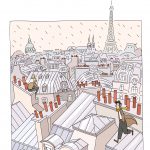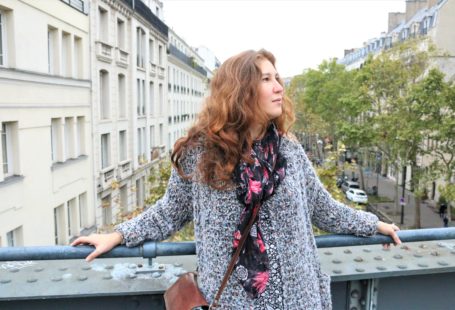Interview for the portal “All Switzerland In The Palm Of Your Hand” (Geneva)
Just as the Geneva Motor Show serves as a “guide” for car enthusiasts from all over the world, so the annual Frankfurt Book Fair acts as a “barometer” for book lovers. The Frankfurt International Book Fair (Frankfurter Buchmesse) is the largest and oldest event of its kind.
It has been held since 1473 and its popularity only grows. This year, for example, the exhibition was visited by almost 300,000 guests and 7,000 participants from 102 countries. In addition to the official Russian delegation, the interests of contemporary authors were also represented by the “Group of Russian Independent Writers”, whose members live in different European cities – Prague, Paris, etc.
In the history of international exhibitions, this is probably the first precedent when authors who write in Russian performed independently, without “patronage” from the publishing house. There are about fifteen books in the portfolio of the “Group of Russian Independent Writers”, but three were presented at the exhibition: The Age of Rain by Olga de Benoist, The Chief Editor by Anastasia Olshevskaya and A Thunderous Silence by Anna Visloukh.
In an interview especially for readers of the Internet portal “All Switzerland In The Palm Of Your Hand”, the writers shared their impressions of the Frankfurt Fair, as well as their views on contemporary Russian literature.
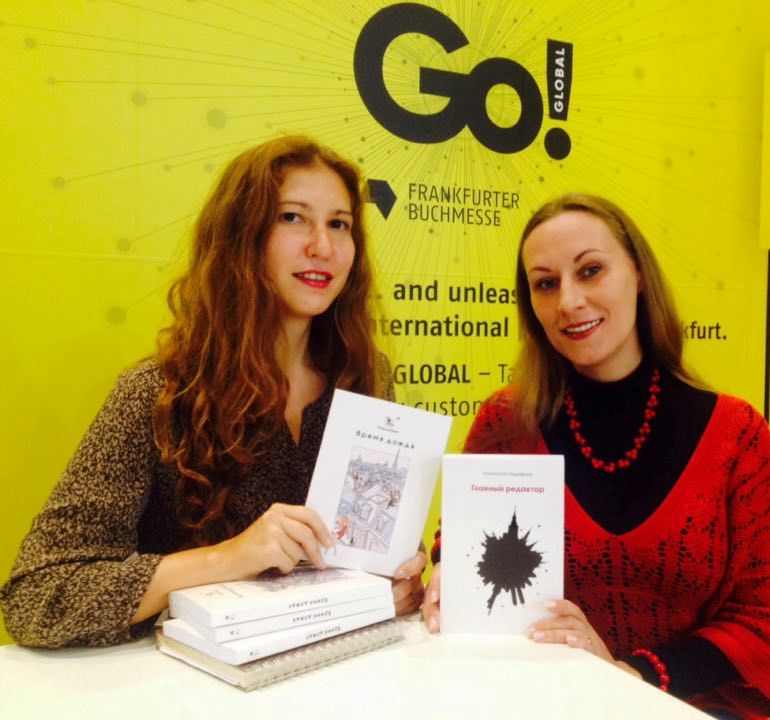
Tell us, please, how did you decide not just to go to the fair, but to present your books on your own without the support of any publisher? Weren’t you afraid of getting lost in the crowd?
Anastasia Olshevskaya: I have been involved in literature for many years, my books have been published by major Russian publishers, including Eksmo, so I know firsthand how things are in the domestic literary market. Unfortunately, they “don’t go well” – you can’t earn a good living as a writer in Russia if you’re not already a “promoted” writer. And it’s not just a matter of the talent of the author or the literacy of the PR campaign. Much is hindered by economic reasons – the crisis on the market, cuts in advertising budgets of publishing houses, the pitiful salaries of copy editors, proofreaders, translators and, as a consequence, the shortage of professional staff.
I think this situation will change sooner or later, and the Russian market will begin to grow. But the question “when?” remains open. So Olga de Benoist, Anna Visloukh, and I decided to try something that no one seemed to have done before us: we organized a group of writers who independently entered the Western market.
Before we went to Frankfurt, we took a long time to find out how the literary industry works in the West. How the book publishing system works in the USA, the Czech Republic, France, Germany, Spain, Italy, etc. We talked to publishers, literary agents, the directors of chain bookstores, established contacts – in general, a lot of work on collecting “information”. And then, with this information in hand, and already knowing what a Western publisher was expecting from a foreign author, we started preparing for the exhibition. We had no idea how our trip to Frankfurter Buchmesse 2017 would end, but we did everything not to “get lost in the crowd of authors”. Judging by the results, we succeeded.
Olga de Benoist: We did not expect that any domestic publisher would decide to “promote” us to the West. The Russian book market, as Anastasia correctly pointed out, is currently experiencing a crisis. Many talented authors have been unable to get published for years and have to scrap their way through self-publishing. And those that do get published are published in small print runs. What is it about dreaming of a global readership, when Russian publishers are not always able to provide access to their own audience.
I liked the idea of going to Frankfurt and I was immediately enthusiastic about it. Going to the fair seemed like a gamble to many people. The “experienced” people told us that it doesn’t work that way. But I like to get involved in adventures and “do the impossible. As the great Lao Tzu believed, “the journey of a thousand li begins with the first step”. Whoever is tired of stomping around, sooner or later needs to take that first step.
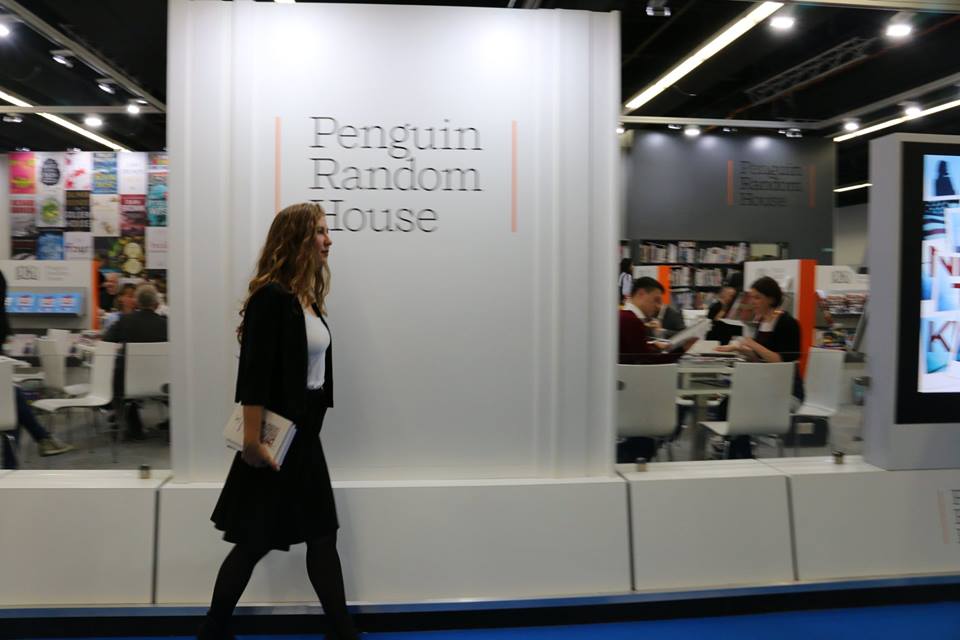
Yes, the decision to go was spontaneous, but the preparation for the fair was thorough and hard working. We had to solve so many organizational issues that sometimes my head was spinning. Logistics, correspondence with business partners, presentations, preparing a package of documents, looking for a lawyer … No, we were not afraid to get lost in the crowd of authors. There was just no time to be afraid.
As the great Lao Tzu believed, “the journey of a thousand li begins with the first step”. Whoever is tired of stomping around, sooner or later needs to take that first step.
Olga de Benoist
– Has such thorough preparation given you results? Have you been noticed by foreign publishers?
Olga de Benoist: We arranged personal meetings with Western partners in advance, sometimes several months before the exhibition. In four days in Frankfurt we had more than two dozen business meetings. We presented our books to the heads of publishing houses and literary agencies from the USA, Canada, Great Britain, Spain, France, Brazil, Argentina, Israel, India, etc. Time will show what will come out of all this.
Anastasia Olshevskaya: At the moment we have reached an agreement with an American publisher to purchase our books for national and university libraries in the USA. Just the other day we received the contract and our lawyers are looking into it. I think this is not a bad result. Especially considering that the exhibition ended less than a month ago.
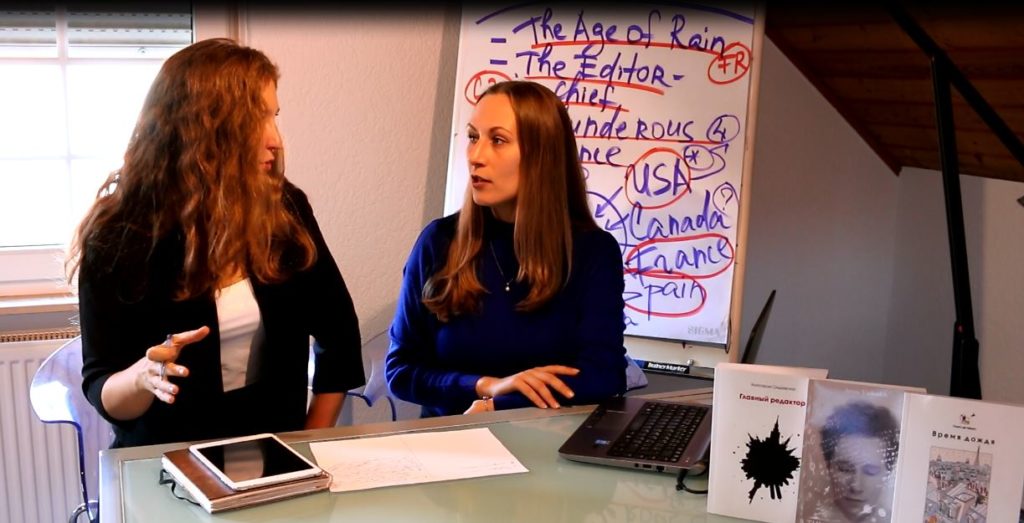
– What publishers were represented on the Russian side besides your group of independent writers?
Anastasia Olshevskaya: Almost all Russian publishers were gathered under a ” common flag” at the Read Russia booth. We spoke on our own, but of course we came up to say hello to our compatriots. Mainly Russian publishers presented our classics to the visitors: Dostoevsky, Tolstoy, Solzhenitsyn, Yevtushenko. Many of the shelves at the Read Russia booth were filled with books on political history: portraits of Soviet leaders and Russian presidents dotted the covers. Unfortunately, there was very little contemporary fiction on the shelves.
Olga de Benoist: That is even more surprising, as some countries, such as France, Italy, Spain, Mexico, the USA, Argentina and Malaysia occupied pavilions with tens of stands. Russia publishes thousands of new fiction books every year, does it have nothing to show to the world?
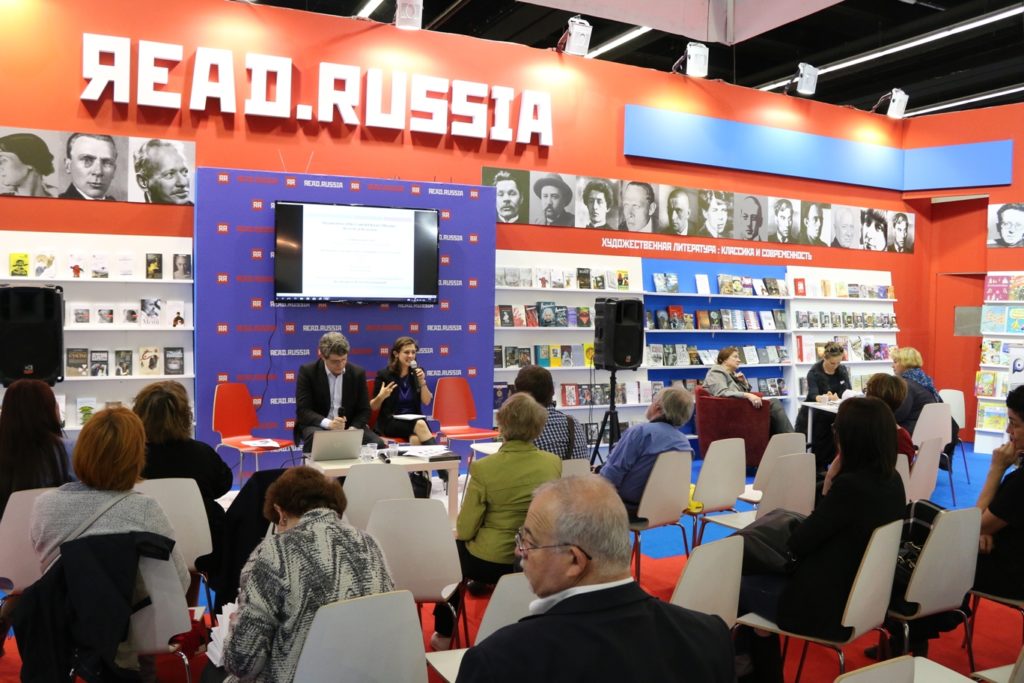
– In your opinion, what opportunities do Russian literature have abroad? And how can a Russian writer win the love of Western readers?
Anastasia Olshevskaya: Judging from the meetings held in Frankfurt and the ongoing negotiations, the commercial potential of Russian contemporary literature is very great. We presented three books at the fair, and all of them aroused lively interest of Western partners. Not only non-fiction, but also fiction, both large and small prose. For example, the collection of short stories and novellas about Paris The Age Of Rain by Olga de Benoist is a book written in the genre of magical realism. By the way, Mikhail Bulgakov worked in this style – one of the few Russian authors of the 20th century who are “on the ear” of the Western reader.
I was also very interested in the mainstream detective novel The Chief Editor, whose events take place both in Russia and the U.S. and reveal the peculiarities of investigative reporting. Of course, as the author of The Chief Editor, I am very happy that foreign publishers saw the commercial potential in my book.
The third book, a memoir by Anna Visloukh called A Thunderous Silence, resonated. It is the story of a Russian boy from the province with an autism spectrum disorder, who graduated from an American university and became a composer. In general, both serious and entertaining Russian-language literature has a good chance of success. But on one condition: the level of the text, the quality of the translation, etc., must be highly professional.
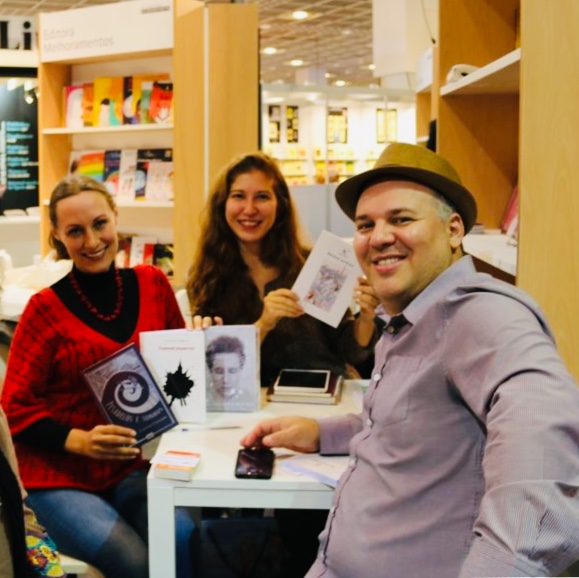
Judging from the meetings held in Frankfurt and the ongoing negotiations, the commercial potential of Russian contemporary literature is very great. We presented three books at the fair, and all of them aroused lively interest of Western partners. Not only non-fiction, but also fiction, both large and small prose. For example, the collection of short stories and novellas about Paris The Age Of Rain by Olga de Benoist is a book written in the genre of magical realism. By the way, Mikhail Bulgakov worked in this style – one of the few Russian authors of the 20th century who are “on the ear” of the Western reader.
Anastasia Olshevskaya
Olga de Benoist: I have the impression that Russian literature is interesting to Western readers, but Western readers are not always interested in Russian literature. In recent years it has become more and more “self-contained”.
The reason for this is not only the crisis, but also the lack of interaction with literary markets in other countries. Consider this. In order for a Russian book to interest a reader from another culture – an ordinary person, not a Russophile – it must meet several conditions.
First, the work must have novelty, a certain exoticism, and charm. Not copying popular international bestsellers, not black fiction, not history of the Communist system and concentration camps, not a piling up of incomprehensible facts and everyday life – there is enough of that in the news – but a reliable and attractive immersion in the atmosphere of another country, another world, in the soul of the Russian man or woman.
Second, the book must concern worldview problems that are close and understandable to everyone, no matter what language they speak. Third, a good translation is needed, and good translators from Russian into other languages are woefully in short supply, overburdened and expensive. And finally, you need the book to get to that person of another culture at some point.
The task of the modern Russian writer, who wants to become part of the world literary process, is to spell out the world of the book in such a way that it finds an emotional response in the world reader. The task of the translator is to interpret this world correctly. And the task of the publisher, the literary agent, is to present the book in the best possible way. There are great prospects for domestic author abroad. Russian literature has already gone this way, making a great contribution to the treasury of world culture, but in recent decades many positions are lost. It is high time to make this journey anew.
The Frankfurt Fair allowed us to feel the pulse of world literature, to understand what trends are emerging. The good news is that the book is alive, the book will live on. What form it will take is another question. Now the western publisher and the reader, first of all are interested in stories connected with personal experiences and author’s experience, that is books based on real events, literature of non-fiction. Such as the book A Thunderous Silence by Anna Visloukh, who is one of the members of our “Group…” We believe that this literature meets the expectations of the Western reading public. It is something that is in great demand in today’s world. Unfortunately, in Russia it is not customary to tell one’s personal story so frankly, especially if it is related to some problems. There are very few success stories in the book market. Success achieved by hard work, not by participating in weird shows for the public’s consumption.
The task of the modern Russian writer, who wants to become part of the world literary process, is to spell out the world of the book in such a way that it finds an emotional response in the world reader. The task of the translator is to interpret this world correctly. And the task of the publisher, the literary agent, is to present the book in the best possible way. There are great prospects for domestic author abroad. Russian literature has already gone this way, making a great contribution to the treasury of world culture, but in recent decades many positions are lost. It is high time to make this journey anew.
Olga de Benoist
– You live in Europe and write in Russian. Who are your books aimed at: a Russian reader or Russian compatriots living abroad?
Olga de Benoist: Literature for me is a way of life and a way of discovering the world. I think many authors would agree with me. But a writer becomes a writer only when he stops “writing silently for future generations”, when his books find their readers. Where my readers live, what language they speak, is secondary to me. The main thing is that after spending a few hours with my book, they feel that the time was not wasted, that they learned something important for themselves.
My heroes are not only Russian characters, but also Europeans, Americans, and Asians. They live in Paris because France and its spirit are close to me and understandable. But that doesn’t mean I’m putting any restrictions on myself. I will write about Russia or any other country I happen to live in. By the way, for the past year I have been collecting materials for a future novel, which I plan to write in French. I wonder what will come out of it myself.
Anastasia Olshevskaya: The Russian-language version of the novel The Chief Editor has already been read by people from twenty countries around the world. Most of the readers, of course, are in Russia, but I hope that in the English translation it will enjoy no less popularity. My books raise topics that people understand no matter what language they speak.
I am sure that there are still values that do not depend on what state one lives in, what race, nationality, gender, social status, religion, etc. These are universal values – both on the micro level (formation, personal growth, family, relationships with loved ones) and on the macro level (good and evil, wars and coalitions, creation and destruction). It is these problems that really resonate in the soul of any person and reader. It is on these themes that I and the authors in our “Group…” write.
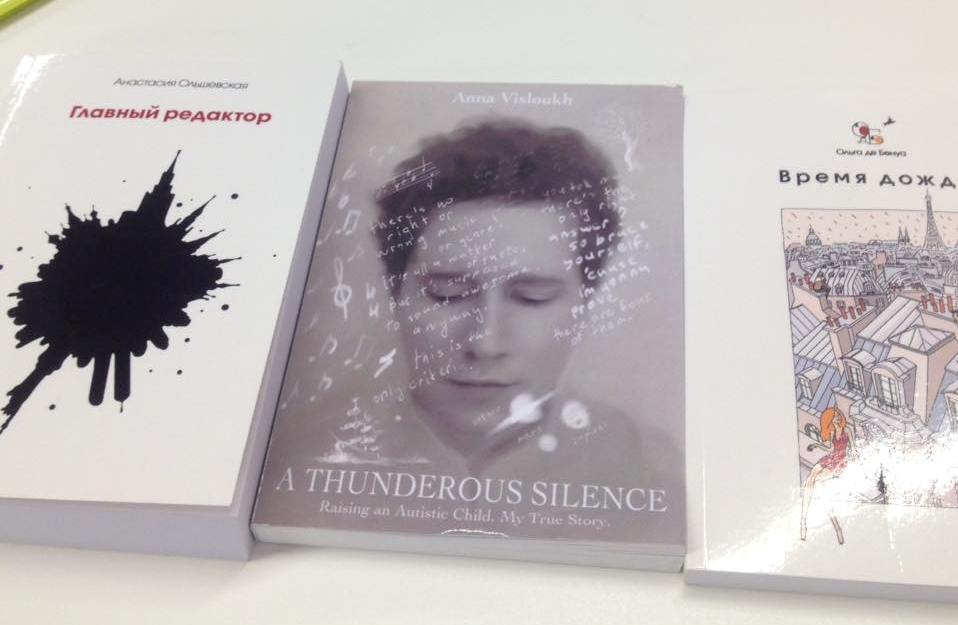
The Russian-language version of the novel The Chief Editor has already been read by people from twenty countries around the world. Most of the readers, of course, are in Russia, but I hope that in the English translation it will enjoy no less popularity. My books raise topics that people understand no matter what language they speak.
Anastasia Olshevskaya
– Switzerland also has an annual book fair – The Salon of Books and Presses in Geneva (“Salon du Livre de Genève”). It is considered the second most important after the Paris Book Fair in the French-speaking world. The next Salon du Livre de Genève, thirty-second in the series, will take place in Geneva at the Palexpo from April 25-29, 2018. Do you plan to make a name for yourself in the Swiss literary market as well?
Anastasia Olshevskaya: We have the most serious plans for entering the European market, so we try not to miss any notable and important events in the literary world. Now we are working on summing up the results of the Frankfurt exhibition; the plan of visiting events for the next year is not approved yet. But in the last six months alone, our authors and their works have also been to book fairs in Jerusalem, Krakow, Moscow…
Some of our works have been translated into several languages. For example, the book A Thunderous Silence is already available in English and in Polish, and was presented not only in Frankfurt, but also at other international fairs. At the last exhibition in Krakow, a Polish publishing house was interested in it. So, without a doubt, we will continue to “expand geographically.
Olga de Benoist: Everything interests us. I think that the Frankfurt exhibition is not the last forum of this scale, in which we took part. It seems to me that nowadays Western readers are interested in learning about life in modern Russia and what is going on in this country. And that is very good. Because the more we know about each other, the better we will understand each other. And that is worth a lot. Some publishers have already offered to meet at the Book Fair in Paris or in Moscow. Maybe there will also be Geneva, who knows? The main thing now is to exhale and understand our possibilities and prospects. We’ll wait and see.
Specially for the Internet portal “All Switzerland In The Palm Of Your Hand” by Gayane Matseichik
